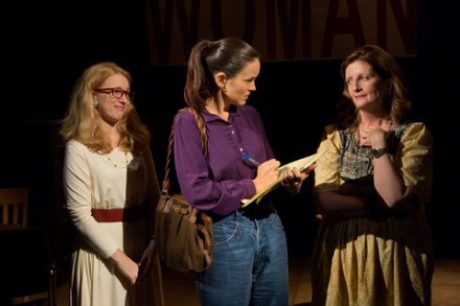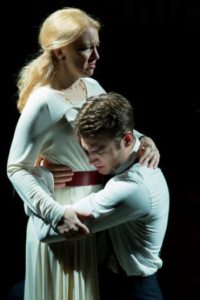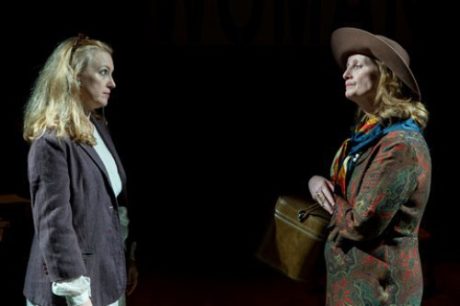Reviewed by Steve Weinstein
Stephen Sondheim had it nearly right in his lyrics to “I’m Still Here.” First, you’re a legend, then you’re camp, then you become an icon. As the Founding Mothers of the Women’s Movement move from this mortal coil into the next life, we’re seeing an inevitable apotheosis of these women — from flesh-and-blood human beings, with all that portends of greatness and smallness, into towering, larger-than-life figures.

Even if its limited run on New York’s Lower East Side hadn’t coincided with the memorial service for yet another of these pioneers, Kate Millett, Jonathan Leaf’s The Fight would have proven a necessary and salubrious corrective. Caitlin Schultz (played by Laura Bozzone), an eager-beaver post-grad student in Women’s Studies, perfectly encapsulates the kind of adulation First Wave feminist leaders receive from their young acolytes. For her thesis, Caitlin has tackled a key moment in the early Women’s Movement, when the more in-your-face, radical Old Guard was replaced by no-less radical, but more bureaucratic, cooler, more media savvy Young Turks.
Representing the Old Guard is Doris Margolies (Judith Hawking), a wife who left her husband to devote herself to the movement that she helped found. A grandmother, she first comes across as something of a yenta, but, as Caitlin gradually discovers, this is only one masque in the multiple personas both she and her adversary assume when it plays to their advantage. Her counterpart, Phyllis Feinberg (Fleur Alys Dobbins), is younger, prettier, with a ruthlessness thinly veiled by an air of sophisticated sang-froid. If Doris is Danton, whose fierce enthusiasm veers recklessly into self-destruction; Phyllis is her Robespierre, the model of probity but with a will of iron and a keen perception of how to play the game to her advantage. Doris made her reputation by exposing the profound frustration that leads to desperation under the veneer of the happy suburban housewife; whereas Phyllis shot to power through her investigative journalism and founding the Movement’s mouthpiece magazine.

If you’re starting to associate these two characters with very famous two real-life counterparts, that may well be Leaf’s intent. There are certainly enough parallels to the real-life feud between Betty Friedan and Gloria Steinem that shook the Women’s Movement to its core. The “famously abrasive” Friedan, as the New York Times noted in its obituary, could be “thin-skinned and imperious, subject to screaming fits.” She described herself, probably accurately, as a “bad-tempered bitch.” Steinem, on the other hand, has always been a get-along gal, someone who’s able to capitalize on her intelligence, wit, good looks and engaging personality to accomplish great things — for herself and for her movement; she, no doubt would have trouble distinguishing between the two as very much would Phyllis Feinberg.
Like Doris and Phyllis, Frieden and Steinem had a long-term bitter rivalry. They were what we’d now call frenemies; only in the heightened and rarified atmosphere of the highest echelons of feminism, such a rivalry could – and most likely did – have real-life repercussions. If there was a women’s convention in which Friedan was usurped by a coalition put together by Steinem, I’m not aware of it, although it is true that Friedan eventually left her beloved NOW under a cloud of some controversy, including her unconcealed discomfort with the group’s large and vocal lesbian contingent.
In The Fight, the confrontation at their mutual organization’s annual meeting becomes the focal point of Caitlin’s research after Doris persuades her that it would make for an original and important thesis and book. Important, that is, as long as she understands what really happened in that long-ago election which, Doris assures her, was rigged to assure her ouster from the group’s executive committee. But when impressionable Caitlin next interviews Phyllis and gets her side of the story, Caitlin begins to have doubts as to Doris’ bona fides.
As Pontius Pilate asked, What is truth? What is truth, indeed: Faced with a Rashomon event deep in the past where the truth is in the teller, dewy-eyed Caitlin starts to develop her own inner Pilate-like skepticism. Paradoxically, Leaf uses the development and sharpening of Caitlin’s journey from ideologue to the harsher world of clashing personalities to draw the audience into greater sympathy for the two protagonists.
When the two finally meet by chance in a brief encounter in an airport, if it’s not the cat fight the audience was anticipating (well I certainly was), it’s a settling of old scores that, as is inevitable in such situations, leaves both sides even more dissatisfied than when she unloaded on her nemesis. Leaf’s intricate construction of this rivalry involves many dissolves into the past, which, under a less able director, would be a confusing mess. Director Peter Dobbin, who runs The Storm Theatre Company, which produced The Fight, does a skillful job in keeping the action brisk even as he ensures the audience understands the time sequence.

Leaf, who is fairly well known for his conservative views, does a remarkable job of not letting personal ideology overwhelm his characters. In fact, he shows great sympathy for these two very different women and how they were able to transform their personal hurdles into the raw material of the movement that would, as they say, shake the world. There’s also a great sympathy for the struggles of Caitlin, who slowly reveals her own backstory as an abandoned single mother. If there’s anything archetypically conservative about The Fight, it’s the undercurrent of importance given to family – and, equally important, the cost of a lack of same.
Doris doesn’t dwell on her children and grandchildren. Far from it. But we can sense that they are never far from her mind. Her love for them, a strong sense of accomplishment for having raised fine sons, and the unreserved love of a grandparent suffuse her worldview. When Phyllis, on the other hand, chose at the very beginning of her post-collegiate venture into the real world to have an abortion, it signified the sacrifice (although she’d never call it that) of family to what would become the all-consuming Movement. If The Fight remains even-handed and takes no sides in the endless Doris-Phyllis feud, Doris, despite her abrasiveness, may come out the victor simply because she leaves the kind of legacy no books, no speeches, no awards can equal: blood of her blood, flesh of her flesh, spirit of her spirit. It’s not retrograde or anti-feminist occasionally to be reminded of that importance.
Running Time: One hour and 40 minutes, including one 15-minute intermission.
The Fight plays through November 18th, 2017, at The Storm Theatre Company performing at Grand Hall, 440 Grand Street in New York, NY. For tickets, call (212) 868-4444 or go online.




